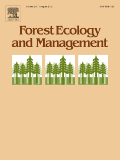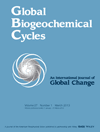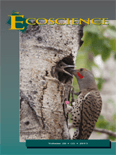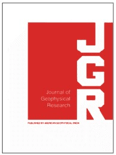
ECOSYSTEMS
Scope & Guideline
Advancing ecological knowledge for a sustainable future.
Introduction
Aims and Scopes
- Ecosystem Functioning and Dynamics:
Research published in the journal often explores how different components of ecosystems interact, including biotic (living organisms) and abiotic (physical and chemical) factors, to influence overall ecosystem health and productivity. - Impact of Disturbances on Ecosystems:
The journal frequently addresses how various disturbances—natural (like fires and floods) and anthropogenic (like land-use changes)—affect ecosystem structure, function, and resilience. - Nutrient Cycling and Biogeochemical Processes:
A significant focus is placed on understanding nutrient dynamics within ecosystems, including carbon, nitrogen, and phosphorus cycles, and how these processes are influenced by environmental changes. - Biodiversity and Ecosystem Services:
The relationship between biodiversity and the provision of ecosystem services is a core area of study, highlighting how species diversity contributes to ecosystem resilience and function. - Climate Change Effects on Ecosystems:
Research often investigates the impacts of climate change on ecosystems, including shifts in species distributions, changes in phenology, and alterations in ecosystem processes. - Methodological Innovations in Ecosystem Studies:
The journal encourages the use of cutting-edge technologies and methodologies, such as remote sensing, machine learning, and experimental manipulations, to enhance our understanding of ecosystems.
Trending and Emerging
- Integrative Approaches to Ecosystem Management:
There is a growing trend towards integrative ecosystem management, which combines ecological, social, and economic factors to address complex environmental challenges. - Resilience and Adaptive Capacity of Ecosystems:
Research focusing on resilience and adaptive capacity in response to environmental changes and disturbances has become increasingly prominent, emphasizing the importance of understanding how ecosystems can recover and adapt. - Ecosystem Services Valuation:
Emerging studies are increasingly valuing ecosystem services, linking ecological research with economic assessments to inform policy and management decisions. - Microbial and Soil Dynamics:
There is an increasing focus on microbial communities and soil dynamics, particularly in relation to nutrient cycling and ecosystem processes, highlighting their critical roles in overall ecosystem functioning. - Climate Change Mitigation Strategies:
Research on ecosystem-based approaches to mitigate climate change, such as carbon sequestration in various ecosystems, is becoming more prevalent, reflecting a response to global climate challenges.
Declining or Waning
- Traditional Ecological Modeling:
There has been a noticeable reduction in papers focusing solely on traditional ecological modeling approaches, as newer methodologies such as machine learning and big data analytics have gained traction. - Species-Specific Studies Without Ecosystem Context:
Research that emphasizes species-specific studies, detached from broader ecosystem interactions, is less frequently seen, reflecting a trend towards integrative ecosystem-level studies. - Static Assessments of Ecosystem Health:
Papers that present static assessments of ecosystem health without considering dynamic changes and resilience mechanisms have decreased, suggesting a move towards more dynamic and process-oriented research. - Historical Ecology Studies:
While historical ecology remains important, there is a noticeable decline in studies focused solely on historical perspectives, with a shift towards understanding contemporary ecological interactions and implications for future management.
Similar Journals

Biogeosciences
Advancing knowledge in biogeosciences for a sustainable future.Biogeosciences, published by COPERNICUS GESELLSCHAFT MBH in Germany, is a prestigious open access journal that has been a leading platform for innovative research since its establishment in 2004. With an impressive impact reflected in its Q1 rankings within both the Earth-Surface Processes and Ecology, Evolution, Behavior and Systematics categories, it caters to a diverse readership encompassing researchers, professionals, and students engaged in the life sciences and earth sciences. The journal's commitment to disseminating high-quality research is evident from its exemplary Scopus rankings, highlighting its role in fostering advancements and discussions in biogeoscience. With full open access options, readers worldwide can freely explore significant findings that contribute to our understanding of ecological and geoscientific principles. As the journal converges into its next decade, it continues to be an essential resource for those seeking to bridge the disciplines of biology and earth sciences.

OIKOS
Fostering groundbreaking research in ecology and evolution.OIKOS is a leading journal dedicated to the field of Ecology, Evolution, Behavior, and Systematics, published by WILEY in the United Kingdom. Since its inception in 1973, OIKOS has established itself as a vital platform for researchers seeking to advance their understanding of ecological interactions and evolutionary processes, with its impact reflected in its prestigious Q1 classification in the 2023 Scopus rankings. The journal's dedication to high-quality research is exemplified by its robust ranking of #106 out of 721 in the relevant categories, situating it within the top 15% of journals globally. With a commitment to disseminating influential findings, OIKOS encourages the open exchange of ideas among a diverse range of scholars, making it an essential resource for academics, professionals, and students alike. Whether you are interested in innovative ecological theories or applied research with real-world implications, OIKOS provides a rich repository of knowledge to inform and inspire your work.

FOREST ECOLOGY AND MANAGEMENT
Advancing Sustainable Forest PracticesFOREST ECOLOGY AND MANAGEMENT is a premier peer-reviewed journal dedicated to the integral study of forest ecosystems and their management, published by Elsevier in the Netherlands. With an impactful presence in the field, this journal boasts a prestigious Q1 ranking in multiple categories, including Forestry, Management, Monitoring, Policy and Law, and Nature and Landscape Conservation as of 2023. It addresses key issues relevant to sustainable forest practices, conservation strategies, and environmental monitoring, making it a vital resource for researchers, practitioners, and policymakers alike. The journal is indexed with an impressive Scopus rank, placing it among the top tier of titles in Agricultural and Biological Sciences and Environmental Science. While it does not offer Open Access options, its rigorous review process and high visibility make it essential for those seeking to stay abreast of the latest findings and trends in forest ecology and management. Published continuously since 1976, FOREST ECOLOGY AND MANAGEMENT aims to foster interdisciplinary collaboration and advance knowledge critical to the stewardship of forest resources in an ever-changing global landscape.

GLOBAL BIOGEOCHEMICAL CYCLES
Connecting disciplines to shape a sustainable future.GLOBAL BIOGEOCHEMICAL CYCLES, published by the American Geophysical Union, is a leading journal in the field of geochemistry that has gained significant recognition since its inception in 1987. With an impressive impact factor and a Q1 ranking in multiple categories such as Atmospheric Science, Environmental Chemistry, and Global and Planetary Change, it serves as a crucial platform for the dissemination of high-quality research. This journal emphasizes interdisciplinary studies focusing on biogeochemical processes and their implications for global environmental change, attracting contributions from a diverse range of scientific communities. Researchers, professionals, and students engaged in atmospheric sciences, environmental chemistry, and planetary sciences will find invaluable insights and state-of-the-art methodologies within its pages. GLOBAL BIOGEOCHEMICAL CYCLES continues to advance our understanding of the Earth’s systems, thus holding a pivotal position in shaping future environmental policies and sustainability efforts.

WEB ECOLOGY
Innovating Insights into Ecology's Digital DimensionsWEB ECOLOGY is a premier academic journal published by COPERNICUS GESELLSCHAFT MBH, specializing in the field of Ecology, with a specific emphasis on the intricate interrelations between web-based ecosystems and environmental factors. Since its inception in 2000, this Open Access journal has provided an invaluable platform for researchers, professionals, and students to disseminate and access cutting-edge research findings. Currently based in Germany, WEB ECOLOGY has garnered a significant reputation, evidenced by its prestigious Q2 quartile ranking in both Ecology and Ecology, Evolution, Behavior and Systematics as of 2023. Furthermore, its impressive Scopus rankings, placing it within the top quartiles of its categories, highlight its relevance and influence in the field. With comprehensive coverage from 2000 to 2024, the journal aims to foster dialogue and innovation in ecological research, making significant contributions to our understanding of web ecology and inviting submissions that push the boundaries of current knowledge.

GLOBAL ECOLOGY AND BIOGEOGRAPHY
Pioneering Research for a Sustainable FutureGLOBAL ECOLOGY AND BIOGEOGRAPHY is an esteemed academic journal published by Wiley that focuses on the dynamic interplay between ecological and biogeographical processes across the globe. With a strong commitment to advancing our understanding of biodiversity, conservation, and global change, this journal has secured a prestigious Q1 ranking in several categories, including Ecology, Ecology, Evolution, Behavior and Systematics, and Global and Planetary Change, highlighting its significant influence in the field. Since its inception in 1998, the journal has consistently provided a platform for high-quality research, featuring original articles that address critical ecological questions and emerging biogeographical trends. Researchers aiming to publish impactful work will appreciate the journal's rigorous peer-review process and its accessibility to a global audience. With a commendable track record reflected in its Scopus rankings, this journal is an essential resource for anyone dedicated to the study of ecology and biogeography.

ECOSCIENCE
Driving innovation in ecological research and conservation.ECOSCIENCE, published by Taylor & Francis Inc, stands as a prominent journal in the fields of Ecology and Environmental Science, recognized for its commitment to advancing knowledge since its inception in 1994. With an ISSN of 1195-6860 and an E-ISSN of 2376-7626, the journal caters to a diverse audience of researchers, professionals, and students passionate about ecological and environmental issues. In 2023, it achieved Q2 and Q3 rankings in the Scopus category of Ecology and Evolution, Behavior and Systematics, reflecting its significance within the academic community. Moreover, ECOSCIENCE occupies notable positions in Scopus rankings, including Rank #324 in Agricultural and Biological Sciences and Rank #210 in Environmental Science, symbolizing its role as a catalyst for disseminating high-quality research. Although currently not open access, the journal's multifaceted scope encourages in-depth discussions on ecological diversity, conservation strategies, and sustainable practices, making it an invaluable resource for those engaged in ecological research and practice.

Journal of Geophysical Research-Biogeosciences
Pioneering Research on Ecosystem Health and Environmental Change.Journal of Geophysical Research-Biogeosciences, published by the American Geophysical Union, is a premier academic journal dedicated to advancing our understanding of biogeochemical processes and their interactions within Earth's systems. With an impressive impact factor reflective of its rigorous peer-review process and outstanding scholarly contributions, the journal ranks in the Q1 quartile across a multitude of essential categories, including Aquatic Science, Atmospheric Science, Ecology, Forestry, Paleontology, Soil Science, and Water Science and Technology, highlighting its significance in multidisciplinary research. Researchers, professionals, and students alike will find invaluable insights and comprehensive studies that facilitate a deeper understanding of environmental changes and ecological dynamics. For those interested in open access options, it provides valuable networking among leading experts in the field, especially for collaborative research that aims to address critical global challenges related to climate change and ecosystem health. This journal serves as a key resource for anyone involved in geophysical and biogeosciences, making significant contributions toward the sustainability and management of Earth's biogeochemical cycles.

Contemporary Problems of Ecology
Exploring Innovative Solutions for a Sustainable FutureContemporary Problems of Ecology, published by MAIK NAUKA/INTERPERIODICA/SPRINGER, is a premier journal committed to advancing research in the field of Environmental Science. Since its inception in 2008, this journal has carved a niche for itself in addressing the pressing ecological challenges of our times, catering to an audience comprising researchers, professionals, and students dedicated to the sustainability and environmental health of our planet. The journal is indexed in Scopus, with a current ranking of #165 out of 233 in the Environmental Science category, reflecting its contributions to the academic community, despite its position in the 29th percentile. With the latest quartile ranking placing it in Q3 for miscellaneous Environmental Science from 2023, the journal continues to be a vital resource for disseminating innovative research findings. Contemporary Problems of Ecology promotes open access scholarship and aims to foster a dialogue among experts, making it an essential platform for those looking to engage with contemporary ecological issues and solutions. The journal actively seeks to publish original research articles, reviews, and case studies that push the boundaries of our understanding of environmental systems.

Limnology and Oceanography Letters
Exploring the dynamics of aquatic environments.Limnology and Oceanography Letters, published by WILEY, is an esteemed peer-reviewed journal dedicated to advancing our understanding of freshwater and marine systems. With an impressive Q1 ranking in both Aquatic Science and Oceanography, this journal has established itself as a pivotal resource for researchers, professionals, and students alike. Since its inception as an Open Access journal in 2016, it has provided unrestricted access to high-quality, innovative research articles that illuminate diverse aspects of aquatic ecosystems and their dynamics. With a publication history from 2016 to 2024 and a significant presence in Scopus rankings—placing it in the top 6% for Oceanography and the top 8% for Aquatic Science, this journal not only fosters scholarly communication but also encourages interdisciplinary collaboration. Addressing pressing issues related to water resource management, climate impact, and ecological integrity, Limnology and Oceanography Letters remains essential for those dedicated to the science of aquatic environments.